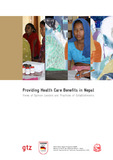Please use this identifier to cite or link to this item:
https://hdl.handle.net/20.500.14356/771Full metadata record
| DC Field | Value | Language |
|---|---|---|
| dc.contributor.author | GTZ/GFA Consulting Group GmbH | |
| dc.contributor.author | Sarmiento, Deborah Carmina B. | |
| dc.date.accessioned | 2012-12-29T00:04:38Z | |
| dc.date.accessioned | 2022-11-08T10:20:16Z | - |
| dc.date.available | 2012-12-29T00:04:38Z | |
| dc.date.available | 2022-11-08T10:20:16Z | - |
| dc.date.issued | 2009 | |
| dc.identifier.uri | http://103.69.126.140:8080/handle/20.500.14356/771 | - |
| dc.description.abstract | Summary: The Government of Nepal (GoN) through the Ministry of Health and Population (MoHP)implemented two pro-poor programs in its efforts to strengthen social inclusion in the health sector. The sustainability of the sepro grams largely hinge on the financial capacity of government, which is believed tohave a limited fiscal space. For this reason, the MoHP intends to study in more depth innovative and equitable forms of financing health care in order to provide social health protection (SHPr).The study reviewed current practices of public and private establishments in providing medical / health benefits to its employees, and survey the views of opinion leaders on the financing of health care. The results of these two surveys provided insights for the political advocacy efforts in moving the agenda of SHPr forward. | en_US |
| dc.language.iso | en_US | en_US |
| dc.publisher | GTZ/GFA Consulting Group GmbH [untranslated] | en_US |
| dc.title | Providing Health Care Benefits in Nepal: Views of Opinion Leaders and Practices of Establishments | en_US |
| dc.type | Technical Report | en_US |
| Appears in Collections: | Post Graduate Grant (PG) Reports | |
Items in DSpace are protected by copyright, with all rights reserved, unless otherwise indicated.

